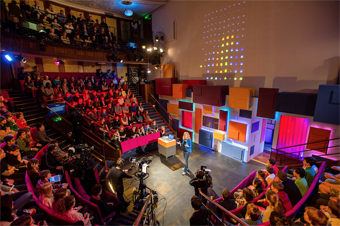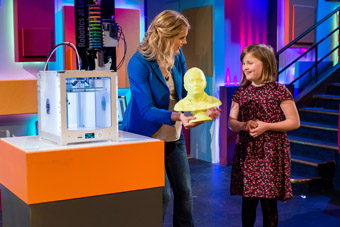
A revolution is happening. Across the world people are taking control of the devices we use every day, customising them, creating new things and using the sparks of their imagination to change the world. Now it’s your turn, and you can start with the things you have around you.
Electrical and electronics engineer, Prof Danielle George takes three great British inventions - a light bulb, a telephone and a motor - and shows you how to adapt them and transform them to do extraordinary things. This is tinkering for the 21st century, using the full array of cutting edge devices that we can lay our hands on: 3D printers, new materials, online collaboration and controlling devices through coding.
Inspired by the great inventors and standing on the shoulders of thousands of people playing at their kitchen table or in their shed, Danielle announces the new rules of invention and shows you how to use modern tools and technologies and things from your home to have fun and make a difference to the world around you.
Anything could happen. Sparks will fly.

Inspired by fellow Geordie inventor Joseph Swan, Prof Danielle George attempts to play a computer game on the windows of a skyscraper using hundreds of light bulbs.
When Joseph Swan demonstrated the first working light bulb in 1878 he could never have dreamed that in 2014 we’d be surrounded by super-bright LED screens and lights that could be controlled using mobile phones. In this lecture, Danielle will explain how these technologies work and show how they can be adapted to help you realise your own light bulb moments. She’ll show you how to send wireless messages using a barbeque, control a firework display with your laptop and use a torch to browse the internet.

Inspired by Alexander Graham Bell, Prof Danielle George attempts to beam a special guest into the theatre via hologram, using the technology found in a mobile phone.
When Scottish inventor Alexander Graham Bell demonstrated the first telephone in 1876, he could never have dreamed that in 2014 we’d all be carrying wire-free phones in our pockets and be able to video chat is crystal clear HD across the world. In this lecture, Danielle will explain how these technologies work and show how they can adapted to help keep you connected to the people around you. She’ll show you how to control paintball cannons with a webcam and turn your smartphone into a microscope whilst also investigating a device that allows you to feel invisible objects in mid-air.

Inspired by the Royal Institution’s very own Michael Faraday, Prof Danielle George attempts to use simple motors to construct the world’s greatest robot orchestra.
When Michael Faraday demonstrated the first electric motor in 1822, he could never have dreamed that in 2014 we’d be surrounded by mechanical devices capable of performing nearly every human task. In this lecture, Danielle will explain how these robotic and motor-driven appliances work and show how they can adapted to help you kick start a technological revolution. She’ll show you how to turn a washing machine into a wind turbine, how Lego can solve a Rubik’s Cube and how the next Mars rover will traverse an alien world.
| Executive Producer | David Dugan |
| Series Producer | Joe Myerscough |
| Production Manager | Lucy Bilson |
| Assistant Producer | Laura Voak |
| Production Coordinator | Fiona Clarke |
| Researcher | Charlotte Lathane |